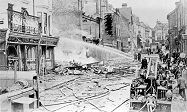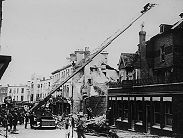1. Air Raid

Fire crews at work on the ironmongers. Sainsbury's is to the left of the picture.
(71kb)

Fighting the fire. Image courtesy of West Sussex County Council Library Service.
(47kb)
East Grinstead, like many other towns, suffered damage from enemy action. The events of Friday 9 July 1943, resulted in one of the worst cases of civilian loss of life.
Late that afternoon, about ten German aircraft crossed the Sussex coast at Hastings heading for London. One of the planes detached from the main group and headed for East Grinstead. It was later thought that he had spotted a convoy of army trucks parked in the main car park just off the High Street. Circling the town twice, he released the bombs into this area at about 5pm. He then circled and approached once more, lower this time and opened fire.
At the local Whitehall cinema, close to the car park, 184 people were watching a cowboy film. Suddenly, an air raid warning flashed up on the screen. Having previously experienced false alarms very few people got up to leave.
Suddenly the roof exploded as a bomb struck. It split in two and the entire structure caved in. Adults and children died instantly in their seats.
A bomb from the German plane fell onto A & C Bridgeland, an ironmonger's shop. 500 gallons of paraffin were stored in Bridgeland's basement.
The fuel exploded.
The blast swept through the parade of shops, destroying Bridgeland's and Rice Bros next door and causing the rear of Sainsbury's branch at 37-39 London Road to collapse.
Fire quickly swept through the area. Eventually a fire crew arrived and got to work putting out the fires.
 Laurie Holmes describes the effects of being caught in the bomb blast. (537Kb Realplayer file) 1min 04secs.
Laurie Holmes describes the effects of being caught in the bomb blast. (537Kb Realplayer file) 1min 04secs.Download Realplayer to see the above. (help)
Transcript of the above: (.doc format)